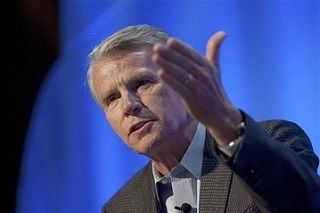As the Decades Roll By, the United States Battles To Remain Relevant


I wouldn’t say we’re welcoming an invasion (with our $700 billion military budget, larger than the next 16 countries’ spending combined). I would, however, say that we’re ushering in a new-found age of irrelevance, and we’re facing an enormous battle if we’re going to avoid it.
I wrote a few years ago about the conference in Detroit in which I first met Ray Lane (pictured above), Managing Partner of VC giant Kleiner Perkins, whom I interviewed a year or two later for Is Renewable Really Doable?. Here’s my original post:
What we did hear a lot over the past few days are what I would call “disingenous self-serving platitudes,” which I refer to as DSPs. One that came up a great deal was the idea that the OEMs, policy makers, utilities, and small businesses are collaborating to make the world a better place for car consumers. Oh please. I find that truly nauseating — not because I wouldn’t dearly like to see it, but because the precise opposite is true. Most of these people are busily but quietly building proprietary standards to lock out competitors and lock in profits — at the expense of what might have otherwise been a smooth and robust adoption curve (of energy-efficient vehicles). A frank admission of this obvious fact would have been really refreshing.
There were dozens of other minor examples that I won’t bore you with; as I mentioned yesterday, almost every speaker had some sort of private business agenda that he/she aggressively pressed down upon the audience. But there were some real doozies as well, a short list of which includes:
DSP #1: Toyota said it will bring along plug-in hybrid technology “soon,” a move that is hailed immediately by the moderator as “bold and courageous.”
The Truth: That company could have, and most people would say should have introduced this technology years and years ago. But, already perceived as being green, the company was under no pressure to do so, and chose to milk the profits out of its current technology platform until it was forced to move along.
DSP #2: GM represented itself as strong, focused, and committed to the plug-in market.
The Truth: Every man, woman, and child in the US was forced to buy GM stock at dozens of times its actual fair market value, because of the company’s astonishing lack of focus and commitment to building cars people wanted. Here’s an article on AutoBlogGreen that goes into more detail.
DSP #3: The governor of the State of Michigan, Jennifer Granholm, proudly announced that Michigan has received about 60% of the total DoE stimulus money aimed at advanced car batteries, explaining that Michigan had effectively made the case that it was committed to a green automotive future.
The Truth: Could she possibly have been serious in this totally outrageous statement? Isn’t this the home of the most vigorous opposition to CAFE standards? Aren’t two of the three Michigan-based OEMs bankrupt precisely because they refused to build environmentally friendly cars that Americans wanted? This was so offensive that I found myself chuckling — softly but audibly. (You should have seen the glares from a few of those within earshot.)
At a certain point, it looked as if it was going to be a solid three days of misleading self-congratulations, arrogance, and gleeful ignorance. But then Ray Lane of venture capital giant Kleiner Perkins took the stage with an approach that was honest, and diametrically opposed to most of those who had come before, or who would follow. I had the opportunity to thank him for his candor after his talk.
He told the audience that investment in innovation in the renewables space is an absolute imperative, and that, despite the rhetoric, he sees little sincere commitment. He pointed out that the US has made such investment in Internet technology, and has seen the results in terms of dominating that industry with Google, Mircosoft, Oracle, Cisco, etc. However, he showed us that we’ve done very little in renewable energy, and that almost all the top players in solar, wind, geothermal, hydrokinetics, etc., are outside the US.
He’s certainly right: the time for politics and glib language is over. We need to look the issue honestly in the face, knock off the deceit, and deliver technology that people honestly want. There is a ready and willing customer base that can’t wait to start buying, I can assure you.
